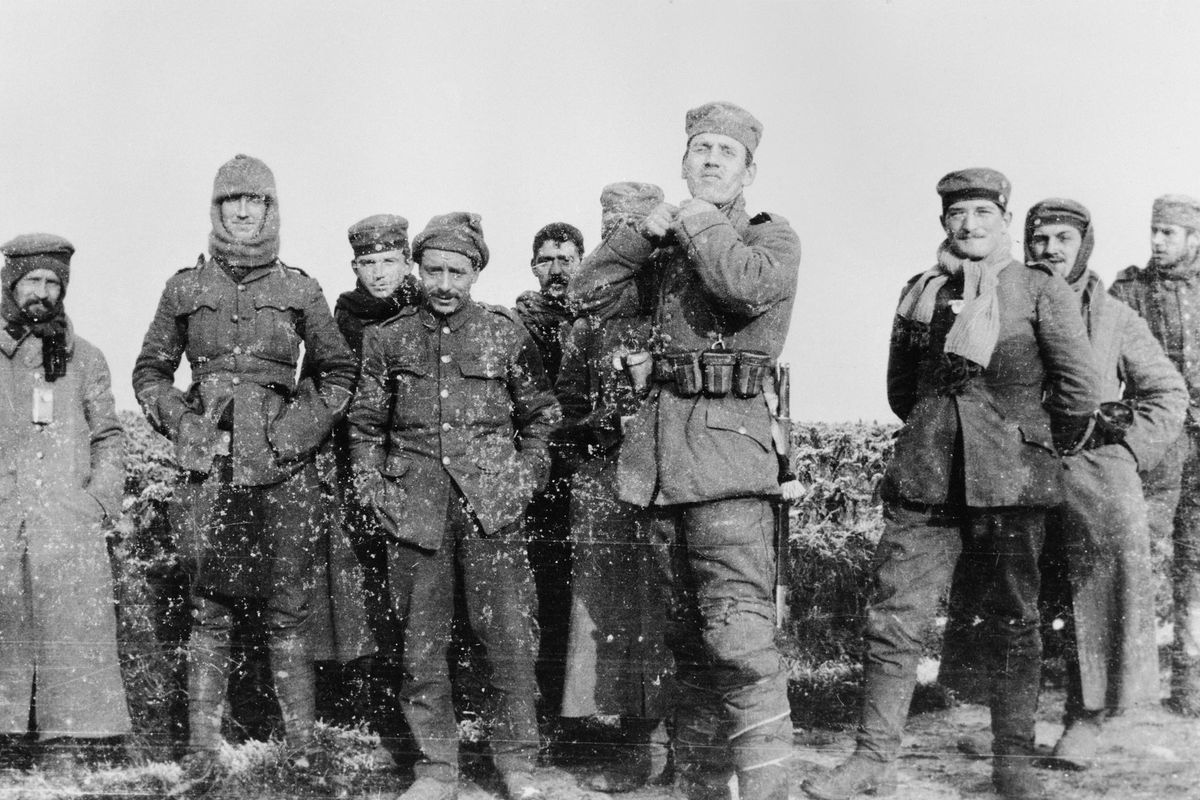Silent night: The Christmas Truce of 1914

Exactly 100 years ago, amid the mud and the blood of World War I, a gentle event unfolded.
Here’s how one British soldier, Rifleman C. H. Brazier, described it:
“On Christmas Eve the Germans entrenched opposite us began calling out to us ‘Cigarettes’, ‘Pudding’, ‘A Happy Christmas’ …, so two of our fellows climbed over the parapet of the trench and went towards the German trenches. Halfway they were met by four Germans, who said they would not shoot on Christmas Day if we did not. They gave our fellows cigars and a bottle of wine and were given a cake and cigarettes. When they came back I went out with some more of our fellows and we were met by about 30 Germans, who seemed to be very nice fellows. I got one of them to write his name and address on a postcard as a souvenir. All through the night we sang carols to them and they sang to us and one played ‘God Save the King’ on a mouth organ.”
This, and many other similar incidents, came to be known as the Christmas Truce of 1914. In the ensuing century, the Christmas Truce of 1914 has taken on mythic proportions. It has been dramatized on stage and screen – and occasionally over-sentimentalized. Yet for a few fortunate trench-dwellers, this coming-together of warring troops was every bit as warm-hearted as later depicted.
This was not an official Christmas truce, despite the best efforts of Pope Benedict XV. Earlier in December 1914, he had proposed an official truce for the Christmas holidays. The Germans agreed to the idea, but only if all of the other warring nations signed on, which they did not. In the end, the truce proposal succumbed to the same dynamics that started the Great War in the first place: mutual distrust and willful miscommunication.
This explains why the dispatches from the front on Christmas Day contained the usual bloody and dispiriting battlefield news. On Dec. 26, 1914, The Spokesman-Review reported that both the Germans and the Western allies claimed to have repulsed several attacks on Christmas Day, and, on the eastern front, the Germans continued to “hammer away” on Russian troops in Poland.
Nobody realized anything unusual had taken place until letters began to arrive home from British and German troops. A number of these letters described touching moments of humanity, between troops who were entrenched within shouting distance of each other in Belgium and France.
“Through the night we sang carols to one another,” wrote a British private named Cunningham. “The German lines were only a hundred yards away, so we heard each other quite plainly. This went on all night. When dawn arrived we started putting our head above the parapet and waved to each other. On our left was a brewery occupied by the Germans and to our surprise we saw a German come out and hold his hand up, behind him were two rolling a barrel of beer. They came halfway across and signed to us to come for it. Three of us went out, shook hands with them, wished them a merry Christmas, and rolled the barrel to our own trenches amid the cheers of both British and Germans!”
Rifleman Brazier’s letter conjured a comical scene in which he and his fellow British soldiers dressed up in top hats, carried umbrellas, “rode bicycles backwards,” and “made the Germans laugh.” Some soldiers later claimed that they played soccer with the Germans, but the evidence for that is sketchy.
The most common “truce” activity was far more solemn. Troops from both sides used this brief period to retrieve their dead from between the trenches. Meanwhile, many soldiers spent Christmas the way they had spent every other day: ducking bullets. One British soldier warned his parents not to believe the “lies” about a Christmas truce, because on his part of the line, “the sniping went on just the same; in fact, our captain was wounded.”
No truce would be repeated in 1915 or any subsequent years. The war had become even more vicious and brutal, something those 1914 soldiers would scarcely have believed possible.
Yet for one brief period, the Christmas Truce of 1914 provided a glimmer of humanity amid the gloom. As one Highland Regiment officer wrote, “It is a great hope for future peace when two great nations hating each other … should on Christmas Day … lay down their arms, exchange smokes and wish each other happiness.”